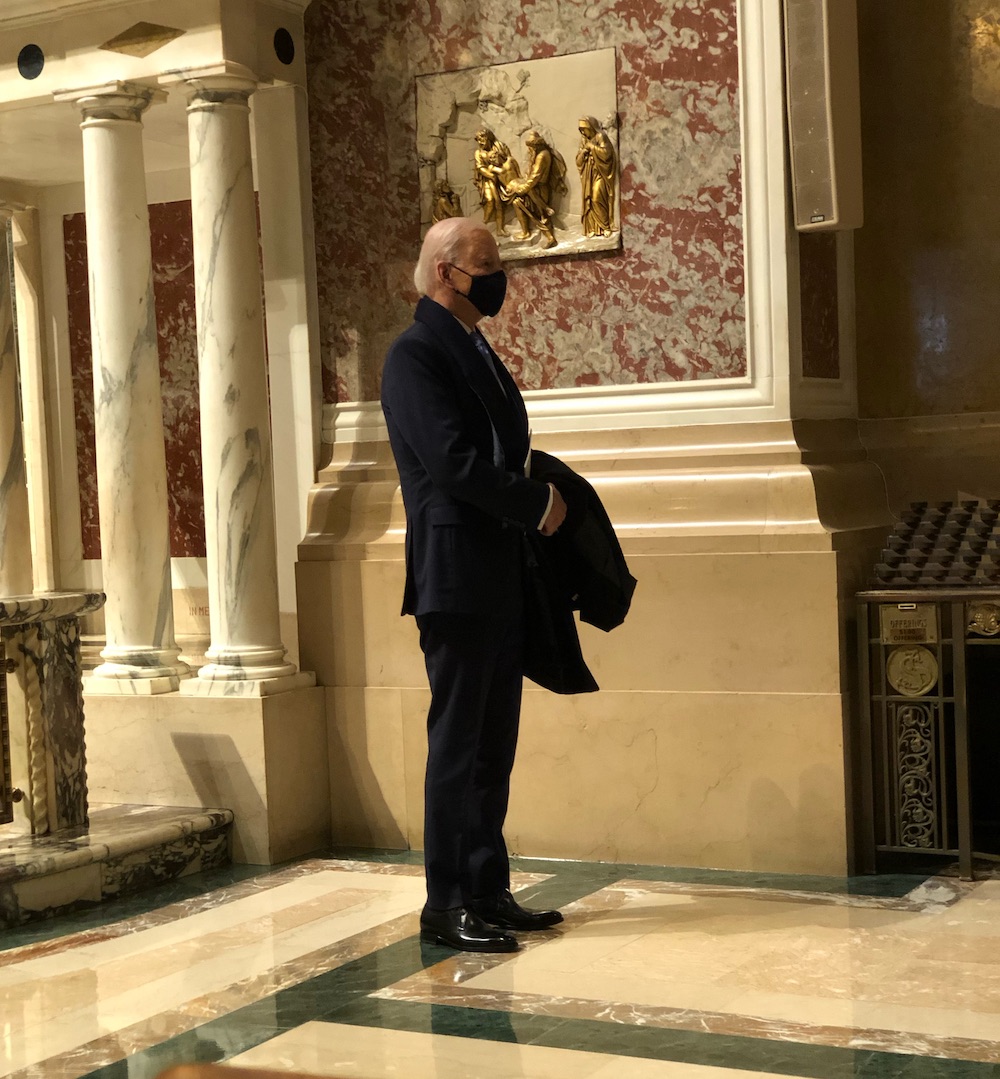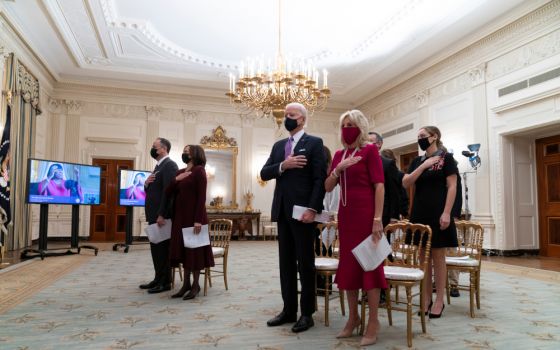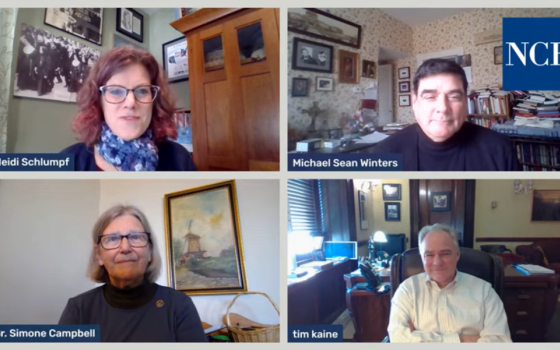President-elect Joe Biden and his wife, Dr. Jill Biden and Vice President-elect Kamala Harris and her husband, Doug Emhoff, attend Mass with their families before the presidential inauguration at the Cathedral of St. Matthew the Apostle in Washington, D.C., Jan. 20, 2021. (CNS/Reuters/Tom Brenner)
Editor's note: The Jan. 20 Mass in Washington, D.C., on Inauguration Day morning was closed to the public, but the pastoral associate for liturgy and director of music ministries at the St. Matthew's Cathedral, who helped plan the liturgy, shares here the music, readings and prayer selections. Others involved in the planning of the liturgy included the presider, Jesuit Fr. Kevin O'Brien; the rector, Msgr. Ronald Jameson; the parochial vicar, Fr. John Benson; and members of the Biden-Harris inauguration committee.
If the liturgy is a more potent form of evangelization, then we might consider how those who attended the Inauguration Day Mass at the Cathedral of St. Matthew the Apostle were evangelized Wednesday morning, Jan. 20.
The Joe Biden and Kamala Harris families began one of the most important days of their lives with a Mass intentionally not for public display. That decision in itself gives an insight into the way Biden lives his faith not as a garment but as integral to his life. The music, readings and prayer texts chosen for this special Mass also reveal much about the way the president chose to begin his new vocation and give us a glimpse into the heart of the man elected to lead the nation.
Music
During the height of a pandemic in which the act of singing is itself considered dangerous, planning music for an indoor public liturgy attended by 150 family members and invited leaders of both political parties was particularly daunting. Despite the challenges, it was decided that music could be an essential part of this liturgy because of its unique power to interpret the Scripture and its ability to speak to the heart in ways recited words alone can't do. By agreement of the inauguration committee and the cathedral, the assembly would not be permitted to sing and any cantors or choir members would be masked at all times.
As guests arrived shortly after 8 a.m., they were greeted by an organ prelude on the cathedral's recently completely French Romantic pipe organ. "Prière" is from a collection of "Quatre Pièces" written in 1910 by Belgian organist and composer Joseph Jongen (1873-1953) and was sensitively played by cathedral organist Paul Hardy.
The second prelude was a plaintive fiddle tune, "Ag Críost an Síol," written by Irish composer Seán Ó Riada to accompany a traditional Irish text that speaks of Christ as both the source and destination of our life's journey.
This was followed by the Irish Hymn, "Be Thou My Vision," sung by the cathedral cantor, Maggie Brown, accompanied by the violin and the organ. This 8th-century text, in many ways, mirrored the themes of the previous piece — that with God as our vision and our wisdom, we may always dwell in God and God in us.
The fourth prelude also took advantage of the violin's unique voice in Irish culture, but here employed to bring to life a piece associated with the American Civil War. "Ashokan Farewell," written by Jay Ungar in 1982, is indelibly associated with the images and stories of that war by its use as the theme for Ken Burn's monumental 1990 miniseries. The events of recent weeks and the survival of our democracy give this piece a new relevance and meaning.
Four veteran members of the Washington-based St. Augustine Gospel Choir, under the direction of Samuel Edison "Eddie" Cromwell, then sang the soulful "Jesus Is Here Right Now," written by St. Augustine's director of liturgical music, from close after the choir's founding in 1977 to 1994, the late Leon Roberts. The text speaks of Christ's peace, which is to be found in the celebration of the Eucharist. It quotes the Last Supper discourse in the Gospel of John: "Do not let your hearts be troubled."
Advertisement
The Mass began at 8:50 a.m. with a rousing song led by the gospel choir, "We've Come This Far by Faith," a traditional processional hymn for African American congregations of many faith traditions. Like the last prelude, it asserts that we need not be discouraged in the face of life's troubles, because "trusting in his holy word, [God] has never failed me yet."
Catholics listening to the conclusion of Biden's Nov. 7 acceptance speech would not be surprised to learn that the setting of Psalm 91 by Fr. J. Michael Joncas, "On Eagle's Wings" would be prominent in the president's Inauguration Day Mass. One can imagine that it has been chosen countless times at Biden family liturgies, most particularly at the funeral of his beloved son Beau. Here it was used as the response to the first reading from Isaiah 58, echoing the phrases: "the Lord shall be your rear guard" and "you shall cry for help, and he will say: 'Here I am!' "
The familiar Gospel acclamation, "Celtic Alleluia," accompanied by the Irish violinist Patricia Treacy, reminded everyone of the immigrant roots of this second Irish Catholic president of the United States, inaugurated exactly 60 years to the day after the first. And with the added poignancy of the second marking the beginning his of term at the very spot from which the first was taken to his grave in Arlington National Cemetery — a sacred place visited by President Biden just five hours after the conclusion of this Mass.
The violin was again principal for the instrumental accompaniment at the preparation of the altar and gifts, using Patrick Cassidy's "The Proclamation."
The vibrant musical setting for the Eucharist Prayer responses was written in 1981 by Leon Roberts, and named for the patron of St. Augustine Parish, which is considered the mother church for Black Catholics in the U.S.
The music chosen for the Communion procession was another familiar hymn for American Catholics. The 1967 "Prayer of St. Francis" by Sebastian Temple is not only a Biden family favorite, but also has a special relevance to the themes that animate his commitment to build bridges and heal wounds. It also recalls the many themes advanced by the current pope who chose Francis as his name.
Renowned opera singer Renée Fleming was the soloist for the post-Communion meditation and the recessional hymn. Schubert's "Ave Maria" is perhaps the most frequently sung solo at Catholic weddings and funerals, but in this context, it had a deeper significance. Joe Biden's quiet and often hidden regular use of the rosary suggests that his desire for the "Ave Maria" reflects an authentic reliance on Mary's intercession as a part of his devotional life.
"America the Beautiful," the chosen final hymn, is perhaps the most authentically religious and least nationalistic of all the patriotic hymns that might be used for such an occasion. It begins with an implicit thanksgiving for the wonders of God, especially in creation. This giving of thanks is at the root of the Greek Eucharistia, which was just celebrated. But the hymn continues in ways especially relevant now. In the first month of 2021, Americans might hear these phrases in a fresh and more poignant way: "Crown thy good with brotherhood … God mend thine every flaw … Confirm thy soul in self-control, thy liberty in law."
The organ postlude was J. S. Bach's "Fugue in C Major, BWV 545."
Perhaps it will come as no surprise that Biden came to speak to several of the musicians after the Mass and thanked them for their contribution.

Then President-elect Joe Biden listens to the last verse of "America the Beautiful" before greeting Renée Fleming at the end of Mass Jan. 20, 2021, at Cathedral of St. Matthew the Apostle in Washington, D.C. (Thomas Stehle)
Mass texts
The presider, Jesuit Fr. Kevin O' Brien, president of Santa Clara University and friend of the Biden family, greeted the assembly by acknowledging the excitement of the day. Knowing the busy schedule ahead, he asked everyone to first quiet and ground themselves "in the faithful love of God and the love they have for one another." Noting that the assembly included people of many faiths and political preferences, he said that what they shared in common was the need to thank God and to rely on God's help and mercy.
The Penitential Act included invocations that resonated with our current time: "… you came to reconcile us to one another and to the Father; you heal the wounds of sin and division."
The Collect, or Opening Prayer, was taken from the Roman Missal, "Prayers for the Head of State or Ruler" but was adapted to include both the president-elect and the vice president-elect. The prayer wishes for them success in the exercise of the high offices and that they secure peace and freedom for the people entrusted to their care.
The eucharistic prayer was from the "Masses for Various Needs: Jesus, Who Went About Doing Good."
It begins by describing the many ways Jesus showed compassion for children, the poor, the sick, the oppressed and the afflicted. After the institution narrative, it continues by asking God to open our eyes to the needs of our brothers and sisters in the world and to follow Christ's example that we may be "a living witness, to truth and freedom, to peace and justice, that all people may be raised up to a new hope."
Readings
The first reading from the prophet Isaiah promised that when we care for the poor and afflicted among us, our light shall break forth like the dawn. That image of light shining forth would be taken up three hours later by a national youth poet laureate, Amanda Gorman, who concluded her poem with similar themes.
The second reading from Paul's letter to the Philippians began with, "Rejoice in the Lord always." It promised that peace that surpasses all understanding awaits those who call upon the Lord.
The Gospel related the story of Jesus returning to his home synagogue in Nazareth and reading from the prophet Isaiah, "The Spirit of the Lord is upon me, because he has anointed me to bring glad tidings to the poor." After completing the passage, Jesus declared, "Today this scripture passage is fulfilled in your hearing."
Final blessing
The final blessing was directed first to Biden and Harris. It asked for safety and health for them both and to bless them with "discerning wisdom, inspired vision, and resilient hope." It concluded with the hope that they might always know "the deep joy of family, friends and Your faithful companionship."
If there is any truth to the notion that liturgy can evangelize, we have reason to hope that Biden's regular celebration of the Sunday Eucharist will draw others who admire him to consider the ways the church, the living body of Christ, might also speak to them and animate their lives to become Christ's hands and heart in the world.
Prayers of the Faithful
The Lord is near to all who call to him. With confidence in God's love and mercy, we offer now these prayers for the world, our nation and all those in need.
For the health and strength of our Holy Father, Pope Francis, who calls us to go to the margins to seek out the lost, the forgotten and the despised; and for ministers from different faith traditions working for justice and reconciliation among all peoples.
For the health and strength of Joe and Jill Biden, and Kamala Harris and Doug Emhoff: May they be blessed with wisdom and courage, with persistent hope and enlightened vision.
For peace throughout the world and an end to war and aggression; for those risking their lives to protect and provide humanitarian aid to innocent peoples; and for those serving in our military and foreign service.
For those suffering from the effects of a warming climate; for all those who are bringing to light the threats to the environment and who are seeking ways to heal our planet.
For immigrants and refugees and those suffering under oppression or occupation. For a change of heart in authoritarian dictators across the globe. And for journalists who are threatened or killed in pursuit of the truth.
For the protection of life, from the vulnerable young to the frail elderly, for the poor and those whose lives are seen as less worthy of protection.
For the healing of our nation; for a deepened commitment to advance racial justice and to find common ground to serve the common good together, and to live with a spirit of humility and empathy modeled after the life of Jesus.
For those suffering from the current pandemic, especially the most vulnerable; for those on the front lines of care and those providing services for us all; for the success of the vaccines and for the strength to remain vigilant in our protection of one another.
For the beloved members of the Biden and Harris families who have died, and for all those who have died from COVID-19, that our merciful and loving Lord may give eternal rest to them as well as consolation to their families and loved ones who mourn.
Just and merciful God, you bless your people with peace, and bestow on us gifts beyond our understanding.
Hear our prayers for your people in need, so that all may share in your abundance and your glory.
We ask this in the name of your Son, our Lord and redeemer, now and forever.
R: Amen.




